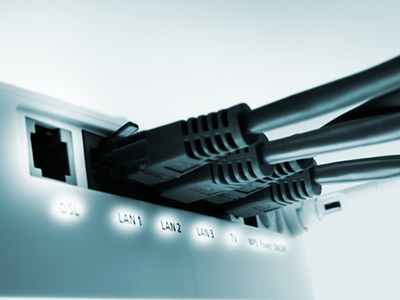Wired vs. Wireless Connection: Which One Makes Sense for Your Business?
Every business has that moment—when the internet slows to a crawl, the credit card machine refuses to process payments, or the Wi-Fi just stops working for no apparent reason.
At that moment, you start asking yourself: Should we have gone with a wired setup instead? Or, if you’re tangled in Ethernet cords, Would Wi-Fi have made our lives easier?
The truth? Both have their place, and the best setup depends on your business. Let’s break it down.
Wired vs. Wireless: What’s the Difference?
Think of a wired connection like an old-school landline phone—physically connected, super reliable, and impossible to lose under a couch cushion. A wired network uses Ethernet cables to connect your devices—computers, printers, point-of-sale (POS) systems—to the internet. It’s fast, stable, and secure, but it also means being, well...wired.
A wireless network, on the other hand, is like your cell phone—no cords, total freedom, but sometimes frustratingly inconsistent. Instead of cables, Wi-Fi broadcasts internet signals through the air, so that devices can connect without being physically plugged in. The upside? It’s more flexible, easier to set up, and great for mobile devices. On the other hand, Wi-Fi can be less reliable, especially in crowded or large spaces.
So which one’s better? Well, it depends on what you need.
Stability and Performance: Wired is King, But Wireless is Still Solid
Need fast, uninterrupted internet? Wired is the way to go. Think about your business’s everyday internet needs: a POS system processing payments, a call center handling back-to-back customer calls, or a graphic designer uploading massive files, perhaps. A wired connection doesn’t slow down just because these things are happening at the same time.
Why Wired Wins
- No lag, no signal drops, no Wi-Fi hiccups.
- It’s stronger, faster, and more reliable than wireless.
- Less interference—Wi-Fi signals can be affected by walls, microwaves, and even fish tanks (seriously, water absorbs Wi-Fi signals).
Now, if your business doesn’t rely on ultra-fast speeds for survival, Wi-Fi can still be a solid choice. It’s easier to set up, way more convenient, and lets employees work from anywhere in the office.
Why Wireless is Still a Solid Option:
- No messy cables that turn into tripping hazards.
- Employees can move around freely without being tethered to a desk.
- Perfect for cafes, retail stores, warehouses, and offices where people move around to work.
But—and it’s a big but—Wi-Fi isn’t always as stable (although having a wireless access point can help). If you’ve ever had your video call freeze while your coworker laughs at something five seconds later, you already know.
Security: Wired is the Winner
Another huge factor to consider? Security. If your business handles sensitive information—things like customer data or financial transactions—wired is the safer route.
Why Wired is More Secure
- No Wi-Fi broadcasting means fewer opportunities for cyber threats.
- Only devices physically plugged in can connect.
- You decide and control who has access (no random devices hopping on).
That said, Wi-Fi can be just as safe if you take the right precautions. Strong encryption, separate networks for employees and guests, and regular security updates go a long way.
How to Lock Down Your Wireless Network
- Use strong encryption (avoid "password123").
- Set up separate networks—one for employees, one for guests and customers.
- Turn off Wi-Fi when you don’t need it.
If security is a top concern but you still want Wi-Fi, a hybrid setup might be the answer (more on that later)—keep sensitive systems on wired and let employees roam free on wireless.
Flexibility: Wireless is the Winner (But It Comes at a Cost)
Want employees to move around the office, collaborate in different rooms, or work on the go? Wi-Fi is the way to go. It’s perfect for businesses with open workspaces, coffee shops, and retail stores.
But if your business doesn’t require that kind of mobility, a wired network is more reliable. It’s also less susceptible to slowdowns, because you don’t have numerous devices trying to join at once and competing for bandwidth.
A hybrid setup is usually the best call. Keep workstations, security cameras, and transaction systems wired while giving employees the freedom to connect wirelessly for meetings, mobile work, and day-to-day tasks.
Scalability: Wireless is Easier, But Wired Lasts Longer
Need to add new employees or devices? A wireless network makes expansion easy—just connect and go, no messy rewiring or office-wide scavenger hunts for open ports.
But if you plan to be in the same location for years, investing in a strong wired network can be worth it. It’s built for long-term stability and is less likely to experience drops in speed because there's a fixed number of devices connected at all times.
Businesses that move frequently or expand quickly may prefer wireless, while those with a fixed location and high-security needs might invest in wired infrastructure.
Want the Best of Both Worlds? Choose a Hybrid Network
Most businesses don’t choose just wired or just wireless—they mix and match based on what makes sense.
Let’s take the example of a boutique retail shop. The cash register and security system are wired to keep things running smoothly, but employees use Wi-Fi to update inventory and process mobile payments.
Or a corporate office—desktops, printers, and security systems stay wired, while employees use Wi-Fi for meetings and laptops.
A hybrid network gives you the best of both worlds:
- Wired for critical devices (POS systems, servers, security cameras).
- Wireless for mobility (laptops, tablets, mobile workers).
- A setup that works for both performance and convenience.
Businesses that move frequently or expand quickly may prefer wireless, while those with a fixed location and high-security needs might invest in wired infrastructure.

So...What's Right for Your Business?
It all comes down to how your business operates. If you need speed, security, and reliability, go wired. If you want flexibility, easy setup, and mobility, go wireless.
Or, be like most businesses and use both.
At the end of the day, your internet should work for you—not against you. If you're unsure what setup is best, TDS Business can help design a network that fits your needs today and grows with you in the future.
Because the last thing your business needs is another frozen video call.
TDS Blog Feed

Paralympic Winter Games take center stage
Coverage of this year's 50th anniversary event available on TDS TV+.





